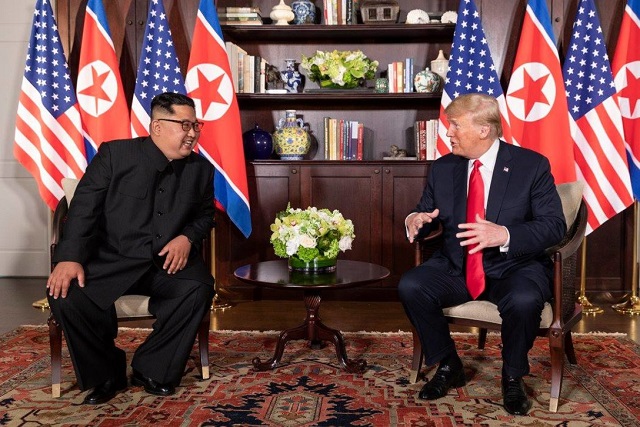
As the weeks roll into months since the breathless spectacle of the US–DPRK summit in Singapore last June, it gets harder to believe that the event broke the issue out of the deep rut it had been allowed to descend into since the DPRK (supported by Moscow and Beijing) attacked the South in June 1950. Pyongyang’s singular journey since that time to become arguably the most isolated, impoverished and repressive regime in the world—a regime that repeatedly displayed a fierce belligerence towards the US and South Korea—has been all but forgotten.
The DPRK has implicitly justified its draconian domestic arrangements as a necessary response to the constant threat of renewed invasion by these states. It expanded its conventional forces to an astonishing total of over 1.1 million (out of a population comparable to Australia’s), before setting out in the 1980s to acquire a nuclear-weapons capability.
No one has succeeded in calling this fantastic construct into question. Moscow tried, once, way back in 1956, which was before it had fully taken shape. Beijing has essentially gone along with it all, remaining discreetly but dependably protective of the DPRK and, when pressed, insisting that it was entirely a US problem.
The Trump administration agreed to a summit with the DPRK in the apparent belief that no one was in any doubt about where the onus of responsibility lay for the parlous state of affairs on the Korean peninsula. All those UN Security Council resolutions confirmed it. A phase of maximum pressure with sanctions, the spectacle of a summit with the new US president with legendary deal-making skills would be the magic combination to untangle this stubborn Gordian knot.
As it turned out, the summit was worryingly thin and the sense of commitment and mutual engagement evaporated together with the departing leaders.
The absence of any interest in doing some essential homework to set the stage for a renewed push to secure a negotiated outcome is proving to be costly. In the leadup to and since the summit, Kim Jong-un has conspicuously conducted himself as the aggrieved party. His posture has been the embodiment of national security 101: the DPRK was driven to nuclear weapons by the unprovoked extreme and relentless hostility of others—but, should that hostility be unmistakably erased and replaced by friendship, trust and engagement, the DPRK accepts that its nuclear weapons will look out of place and be prepared to seriously consider dismantling them.
How Kim got to this point—where the onus is on the US to prove the absence of enmity and display its preparedness to give friendship, trust and engagement credibility and permanence—will be studied for a long time as an exercise in skillful gamesmanship.
In the lead-up to the Singapore summit, Kim conceded nothing to US posturing in favour of a fast-tracked ‘Libyan’ solution and eventually had Donald Trump also foreshadowing a number of bilateral summits. Most importantly, however, with the Singapore summit locked in, Kim abruptly re-engaged with China and has since made clear that the close relationship of the past has been restored.
Whether the ground for this critical development had been quietly prepared beforehand is not known. Nor is anything known about the terms of the re-engagement or any understandings between the two states on the objectives to be pursued in future DPRK–US negotiations. The secrecy that has always shrouded this crucial dimension of the Korean puzzle has bedevilled all past negotiations.
Since returning from Singapore, Kim has presented the apparent disabling of his underground nuclear test site and of a rocket engine test facility, plus the repatriation of remains of US and allied servicemen from the Korean War, as his initial down payment and looked to Washington for reciprocity, particularly in winding back sanctions.
He has displayed a new obsession with economic development, a stance that has wrong-footed the US, making it look mean-spirited, because it has prolonged sanctions in response to the absence of serious progress on denuclearisation. The important bits of the DPRK’s nuclear program—the production of fissile material and missile systems—have, if anything, been expanded since Singapore.
The Trump administration has belatedly cut its losses by downgrading the point of contact with Pyongyang to a special envoy from the business world with no background in the issues—not even the secretary of state, let alone the president. It has also signalled that it’s taken note of Beijing’s close association with the stance being adopted by Pyongyang.
From the narrow perspective of gamesmanship and posturing, the DPRK is way ahead on points. The bigger conclusion is that the glimmer of an opportunity to defuse the DPRK nuclear issue with a degree of surgical precision has passed. The DPRK–China team has reaffirmed that this will happen only in the context of a much broader exercise in geopolitical engineering.
 Print This Post
Print This Post